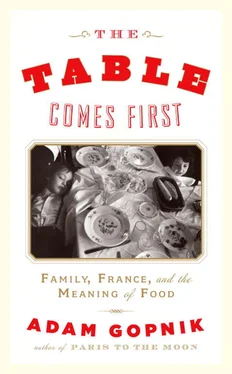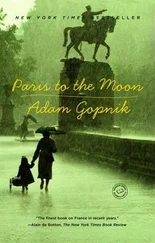The usual reasons that move men and women as they age moved me: I was self-conscious about gaining weight, crossing into the world where you slowly become doughier and wake up as a middle-aged man with a paunch. (“I looked in the mirror,” a woman novelist-friend said not long ago, “and saw that I was … stout . Like a character in Trollope: ‘She was a stout, upright lady in the prime of life…. ’ ”) It is true, of course, that the paunch was once a hard-sought ornament of abundance, rather than a flying buttress of overindulgence—the stout lady or gentleman was once the only steady lady or gentleman—but though that time might be one to envy, still we live in this time and not some other. So I decided to stop eating desserts, to see if that would help. Like all diets, both the reducing kind and the religious kind, mine had an element of logic (lose those calories neatly, and at once!) and an element of magic, too (give up the thing you like best and you will appease the gods of aging).
I love desserts. I think of my mother and I taste desserts. My mother, though a scientist with an academic career, made her own desserts every night of my childhood: lemon tart, chocolate cake, wonderful coffee custard with bittersweet chocolate hardened like a winter lake on top, and hot apple pie with light custard sauce. I am aware that pies and cakes and cupcakes are the more usual thing to love from Mom’s kitchen. But she was a Francophile, and made soufflés, and those I loved best of all. Yet they were the one dessert of hers that I couldn’t make for my own children. When I left home, she gave me a self-published recipe book that included her formula for apricot and Grand-Marnier soufflés. I had followed it dutifully over the years, and never gotten it quite right. There was a moment when you were supposed to know that the egg whites were beaten—a zone with danger and failure on either side. “DO NOT OVERBEAT / DO NOT UNDERBEAT!” she had written in the recipe, and once again the written orders hurt as much as helped. Although I had seen the proper moment, the true loft, countless times, the presence of the words somehow froze the operation, made the right state of beaten egg whites an unobtainable condition. I could never find the zone.
Sugar flows through every modern life, and body, with a fluidity that would have shocked our sugar-starved ancestors, and so we withdraw from it with the same difficulty that we withdraw from the other shapers of our senses, alcohol and caffeine. For the first time in my life I knew what a craving was, understood the otherwise puzzling condition of friends who had passed through AA or through crack addiction, and whose frailties I respected but whose needs I could never before quite conceptualize, internalize: what was it that could lead people to act in a way so plainly not in their own self-interest? Having seen what the bottle or the pipe does to you, why not just give up the bottle or the pipe? The answer, I now saw, is that the craving isn’t a war inside you, as in those old quarrels between the devil and the angel, the kind that used to perch on Sylvester’s shoulders as he decided whether it was wrong or right to try to eat Tweetie. No, it was more of an urge to surrender to some other self-willed person who lives inside you, controls your steps, and just wants in the worst way. I would wake up at night and, unself-willed, wander toward the freezer and the ice cream—the state of hunger for something isn’t the state of deciding to have, but lies outside decision, lies outside your self, even, exists as a kind of magnetic impulse to which one need only surrender. Hunger is a field that draws you forward and that you enter simply by choosing not to resist. If it were up to me, the addict says, I’d stop. And we shake our head at his rationalization—but it isn’t up to him. A habit is not a gleeful preference of something bad for you to something good for you; it is an attraction that draws you toward something that feels neither good nor bad, but only necessary. (Which is why, I suppose, addicts only get better in the company of others. They bond together to try to build a passive force field greater than that other force field, which brought them there.)
The curious thing was that, while it was hard to do without sweets at home, it wasn’t nearly as hard when we went out to eat, and especially not when we went out to eat fancy food. It was as if the dessert chefs had given up on dessert, too, and produced something else in its place. At even a moderately upscale establishment, you would invariably get what I had come to think of as the Portman Plaza plate, since it so closely resembled the model that a developer would have proposed for the center of a crime-racked mid-sized city in the seventies: three upright cylinders—small towers of something wrapped in something—with the tops sliced at an angle; a crumbly landscape of some kind; and a reflecting pool running around the edge. The plate would be advertised as, let’s say, a chocolate-peanut-butter mousse cake with walnut-balsamic crumble and a sesame sorbet with Concord-grape foam. But the effect was always the same: not enough of a cakey cylindrical thing, too much of a crumbly thing, far too much of a gelatinous thing, and an irrelevance of an off-key runny thing. Without surrendering sugar, dessert had surrendered all its familiar forms—the cake, the soufflé, the pudding—as the avant-garde novel had surrendered narrative, character, and moral. Losing our faith in art is, in a secular culture, what losing our faith in God was to a religious one; God only knows what losing our faith in desserts must be.
Leafing through books at the neighborhood cookbook store, I slowly became aware that our dessert modernism sprang from somewhere else, and had a more revolutionary purpose than I knew—that the Portman plates were to a European movement what the Portman Towers had been to the Bauhaus, the American domestication of something austere and rigorous. Here in New York, the true, uncompromised revolution was limited to a handful of places, and I went to one of them, Wylie Dufresne’s wd-50. I broke my sweet fast, and had a full roster of the pastry chef’s delicious devisings: cheesecake with dried pineapple, pineapple purée, and pineapple tuiles; lemongrass mousse with lemongrass foam. The chef, Alex Stupak, turned out to be an intense intellectual, clear and dry in his judgments.
“I happen not to like sweets,” he said as we sat down after dinner and he began to explain his work. “It’s an idiosyncrasy of mine. I decided to become a pastry chef because it gave me autonomy. Whether you think your desserts are manipulated or not, they are! When you’re conceptualizing an entrée, a protein, you generally expect to get a piece of that thing intact. In pastry, it doesn’t occur. Pastry is the closest that a human being can get to creating a new food. A savory chef will look at puff pastry not as a combination of ingredients but as an ingredient in itself. Pastry is infinitely exciting, because it’s less about showing the greatness of nature, and more about transmitting taste and flavor. Desserts are naturally denatured food.” He looked at me sternly. “Birthday cake is the most denatured thing on earth.”
When I asked him who had influenced him, his eyes, which had been narrow slits of purpose, suddenly shone bright. “I admire Albert Adrià more than any other cook in the world,” he said.
Everywhere I went, I heard similar talk of Albert, his brother Ferran, and other Catalan dessert wizards. Dan Barber, of the restaurant Blue Hill, spoke reverently of Jordi Roca, whose restaurant, run with his two brothers and situated not far from the Adriàs’ elBulli, had recently been voted one of the five best in the world; on a visit to New York, René Redzepi, whose restaurant, Noma, in Copenhagen, had in the same poll been named the best restaurant in the world, spoke of both Adrià and Roca with the same quiet awe.
Читать дальше












